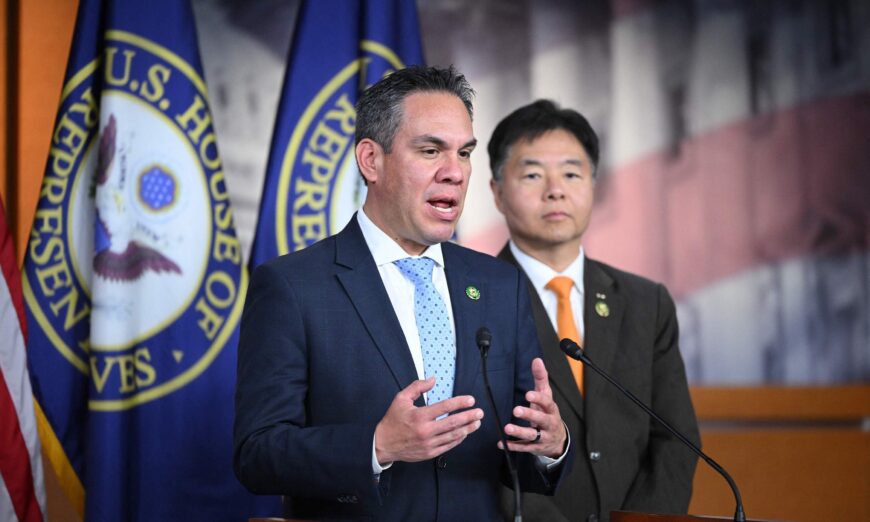ESG critics influence attendees at green conference.
The Economist’s “Sustainability Week” Meeting: A Call to Action
The general consensus at The Economist’s “Sustainability Week” meeting in Washington wasn’t hard to miss: environmental problems pose an existential threat that the market and the government can partner to thwart.
That perspective, which can be heard in elite technocratic circles from New York City to Brussels, came across strongly in one early question from moderator Vijay Vaitheeswaran, the publication’s global energy & climate innovation editor.
“Does the arc of history bend toward sustainability?”
Vaitheeswaran asked the crowd, seemingly invoking former President Obama’s frequent references to “the arc of history.”
When a panel with the White House’s Heather Boushey was interrupted by a group of anti-fossil fuel protesters, Vaitheeswaran’s response was initially conciliatory.
“We appreciate your passion,” he said before moving to eject the protesters.

Unsurprisingly, speakers were generally friendly to environmental, social, and governance (ESG) principles in investing, currently a partisan battleground in Washington and across the United States.
West Virginia Treasurer Riley Moore and other officials have led the charge against applying ESG principles to state money, asserting that the movement and related strategies target coal, oil, natural gas, and other hydrocarbon fuels crucial to their local economies.
ESG defenders argue that the approach helps investors align their money with their personal values and claim that anti-ESG measures represent an assault on the free market.
During a May 30 panel discussion, University of Pennsylvania professor Witold Henisz said there is “real concern and fear” in the business world surrounding ESG.
“I don’t think there’s any chance that the anti-ESG movement will win,” he said during that same panel.
Yet, during a May 31 debate on ESG, criticisms of the philosophy from a pro-impact investing standpoint moved a few of the listeners—though the vast majority remained persuaded of ESG’s critical importance.
Henisz and investor Terrence Keeley debated whether “ESG is vital and a necessity in the battle against climate change.”
Keeley authored a 2022 book, “Sustainable: Moving Beyond ESG to Impact Investing,” in which he made the case against ESG as a means of realizing certain social and environmental goals.
Virtually everyone present supported ESG as vital and necessary before the debate. Yet afterward, a small percentage had changed their minds.
In his opening remarks, Henisz claimed the hundreds of billions in capital expenditures necessary to reach net-zero emissions could not be moved without the animating force of ESG.
“The ESG movement is far from perfect, but it has made significant strides in aligning capital with sustainability goals,” he said.
The Economist’s “Sustainability Week” meeting in Washington was a call to action for environmental sustainability. The general consensus was that environmental problems pose an existential threat that the market and the government can partner to thwart. Moderator Vijay Vaitheeswaran asked the crowd, “Does the arc of history bend toward sustainability?” This perspective is shared by elite technocratic circles from New York City to Brussels.
Speakers were generally friendly to environmental, social, and governance (ESG) principles in investing, which is currently a partisan battleground in Washington and across the United States. However, West Virginia Treasurer Riley Moore and other officials have led the charge against applying ESG principles to state money, asserting that the movement and related strategies target coal, oil, natural gas, and other hydrocarbon fuels crucial to their local economies. ESG defenders argue that the approach helps investors align their money with their personal values and claim that anti-ESG measures represent an assault on the free market.
During a May 31 debate on ESG, criticisms of the philosophy from a pro-impact investing standpoint moved a few of the listeners—though the vast majority remained persuaded of ESG’s critical importance. Virtually everyone present supported ESG as vital and necessary before the debate. Yet afterward, a small percentage had changed their minds.
In his opening remarks, University of Pennsylvania professor Witold Henisz claimed the hundreds of billions in capital expenditures necessary to reach net-zero emissions could not be moved without the animating force of ESG. “The ESG movement is far from perfect, but it has made significant strides in aligning capital with sustainability goals,” he said.
The Economist’s “Sustainability Week” meeting was a reminder that we all have a role to play in protecting the environment. Let’s work together to make a difference.
" Conservative News Daily does not always share or support the views and opinions expressed here; they are just those of the writer."




